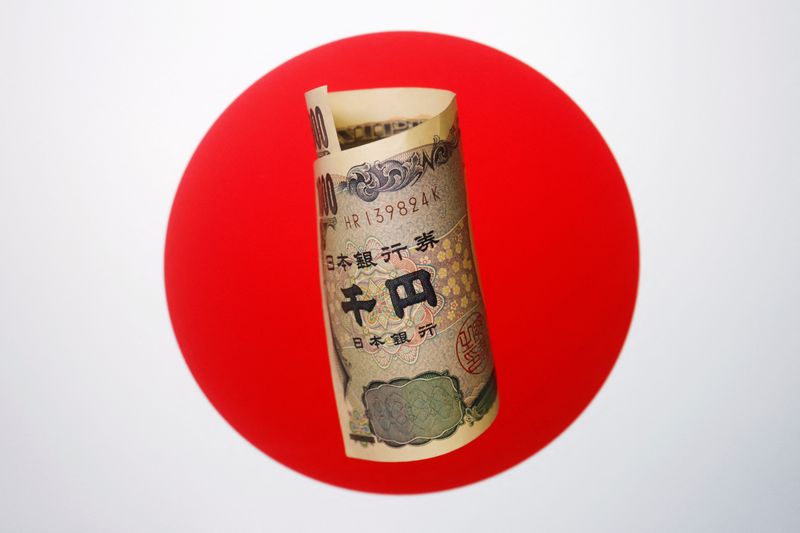By Kantaro Komiya
TOKYO (Reuters) - Japan will not intervene to stem the yen's decline, said just over half of economists polled by Reuters, though a fifth said weakening beyond 150 per U.S. dollar could trigger action.
With a widening gap between the Bank of Japan's (BOJ) ultra-loose policy and rapid tightening of its global peers, the yen has lost nearly 20% against the greenback this year, hitting a 24-year low of 144.99 and prompting policymakers this month to flag a readiness to act in the face of volatile currency movement.
The market is bracing for further volatility and possible government action ahead of an upcoming series of major central bank meetings, including the BOJ, U.S. Federal Reserve and Bank of England. The yen traded at around 143 on Wednesday. [ECILT/US][ECILT/GB]
Still, a slim majority of economists thought any direct action was a long shot. Twelve of 23 respondents, or 52%, said the government would not buy yen to stop the currency from further weakening, the Sept. 8-19 poll showed.
Any internationally coordinated action also is unlikely as the United States favours a strong dollar to curb inflation, said Akiyoshi Takumori, chief economist at Sumitomo Mitsui (NYSE:SMFG) DS Asset Management.
"The 'rate check' surprised everyone, but intervention-signalling would be the last thing they could do," Takumori said, referring to the BOJ last week asking currency traders for current rates - queries widely seen as a prelude to intervention.
Five respondents said 150 yen per dollar would prompt intervention.
Hiroshi Watanabe, senior economist at Sony (NYSE:SONY) Financial Group, said intervention "might be possible if the yen falls beyond the 150 line at very high speed, but in reality, it's extremely unlikely given the ineffectiveness of currency intervention".
Another three chose "155 yen per dollar" when asked for a trigger. Two selected 160 and one picked "weaker than 165 yen per dollar".
Japan last carried out yen-buying intervention in 1998, when the Asian financial crisis triggered a yen sell-off and rapid capital outflow.
WEAKER GROWTH, FASTER INFLATION
Economists in the survey downgraded their growth outlook for Japan due to accelerating inflation, coronavirus resurgence and a global economic slowdown.
The economy will likely expand an annualised 1.4% in July-September, less than the 2.0% forecast in an August poll, showed the median estimate of 35 respondents. The projection for October-December was 1.9%, versus the previous poll's 2.2%.
In the second quarter this year, the world's third-largest economy grew 3.5%, helped by robust consumer and corporate spending.
The core consumer price index (CPI), which excludes volatile fresh food items, will likely rise 2.8% in the last three months of this year, the poll showed, more than the previously estimated 2.5%.
Economists expected core CPI to rise to 2.4% this fiscal year, before slowing to 1.2% in fiscal 2023, the poll showed.

Elsewhere in the poll, BOJ Deputy Governor Masayoshi Amamiya was economists' top pick for the central bank's next chief to succeed incumbent Haruhiko Kuroda in the spring.
(For other stories from the Reuters global economic poll:)